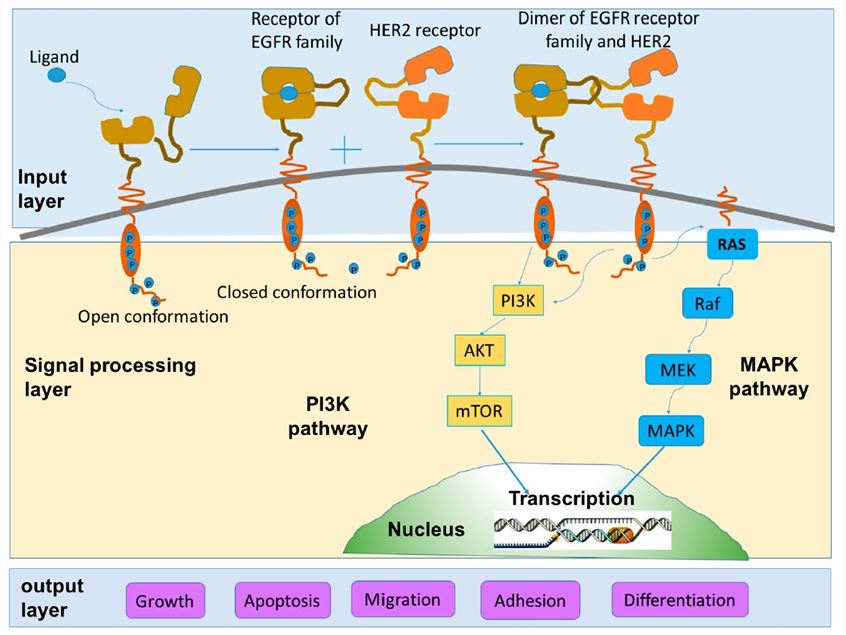Introduction of HER2
HER2 is an acronym for human epidermal growth factor receptor 2, also known as Neu or ErbB2. It is a 185 kDa transmembrane glycoprotein consisting of four extracellular domains (ECD), a transmembrane domain, and an intracellular domain with tyrosine kinase activity. HER2 primarily regulates cell proliferation, differentiation, and survival through the phosphatidylinositol-3-kinase (PI3K) and mitogen-activated protein kinase (MAPK) signaling pathways. Amplification of the HER2 gene or overexpression of the HER2 receptor plays a significant role in various cancers, such as breast cancer, gastric cancer, bladder cancer, cervical cancer, and others. Therefore, HER2 is an ideal target for anti-tumor therapy.
Signaling Pathways Involved in Bispecific Antibodies Targeting HER2 and HER2
Bispecific antibodies are antibodies that can simultaneously recognize two different antigens or epitopes with high specificity and affinity. Bispecific antibodies targeting HER2 can exert anti-tumor effects through various mechanisms, such as blocking HER2 heterodimerization with other family members, inhibiting HER2 downstream signaling pathways, inducing HER2 receptor internalization and degradation, enhancing antibody-dependent cell-mediated cytotoxicity (ADCC) and complement-dependent cytotoxicity (CDC), and recruiting immune effector cells to kill tumor cells.
In general, bispecific antibodies targeting HER2 and HER2 mainly affect two important signaling pathways: PI3K/AKT and MAPK. The PI3K/AKT signaling pathway is a signaling pathway that regulates various biological processes such as cell survival, proliferation, migration, metabolism, and angiogenesis. The MAPK signaling pathway is a signaling pathway that regulates various biological processes such as cell differentiation, proliferation, apoptosis, migration, inflammation, and immune response. These two signaling pathways play important roles in many cancers, and they interact and coordinate with each other. Therefore, bispecific antibodies targeting HER2 and HER2 can achieve stronger anti-tumor effects by simultaneously inhibiting these two signaling pathways.

Fig.1 Schematic Diagram of HER2 Signaling Pathways (Lv Q, 2016)
In addition to the PI3K/AKT and MAPK signaling pathways, bispecific antibodies targeting HER2 and HER2 can also affect other tumor-related signaling pathways, such as:
-
The JAK/STAT signaling pathway: involved in various cellular processes, including cell proliferation, differentiation, migration, apoptosis, immune response, and others. Abnormal activation of this pathway in certain cancers leads to tumor cell proliferation, invasion, metastasis, and immune evasion. Bispecific antibodies targeting HER2 and HER2 can inhibit this pathway by blocking the dimerization of HER2 with other receptors, such as EGFR.
-
The NF-κB signaling pathway: responds to external stimuli and is involved in cell proliferation, apoptosis, inflammation, immune response, and other processes. Persistent activation of this pathway in some cancers leads to tumor cell proliferation, inhibition of apoptosis, angiogenesis, and immune evasion. Bispecific antibodies targeting HER2 and HER2 can inhibit this pathway by inducing the degradation of the HER2 receptor.
-
The Wnt/β-catenin signaling pathway: determines cell fate and is involved in cell proliferation, differentiation, migration, autophagy, and other processes. Abnormal activation of this pathway in certain cancers leads to tumor cell proliferation, invasion, metastasis, and maintenance of stem cell characteristics. Bispecific antibodies targeting HER2 and HER2 can inhibit this pathway by blocking the downstream GSK3β of the HER2 receptor.
Clinic Status of Bispecific Antibodies Targeting HER2 and HER2
There are currently different types of bispecific antibodies targeting HER2, including dual-variable domain immunoglobulin, bispecific T-cell engager, bispecific trivalent antibody, bispecific tetravalent antibody (TetraMab), and others. Some of these antibodies have entered the clinical trial stage, while others are still in the early stages of research and development.
Table 1. Bispecific Antibodies Targeting HER2 and HER2 in Clinical Trials
|
Bispecific antibody
|
Target
|
Clinical trial phase
|
Indication
|
Population
|
Country/region
|
|
ZW25
|
HER2/HER2
|
Phase II
|
Breast cancer/gastric cancer/ovarian cancer and others
|
HER2-positive or low-expressing
|
USA/Canada
|
|
SYD985
|
HER2/HER2 (ADC)
|
Phase III
|
Breast cancer
|
HER2-positive or low-expressing
|
USA/Europe
|
|
Margetuximab
|
HER2/HER2 (ADC)
|
Phase III (completed)
|
Breast cancer/gastric cancer
|
HER2-positive
|
USA
|
As shown in the table, bispecific antibodies targeting HER2 primarily focus on breast cancer and gastric cancer, which have a high proportion of HER2-positive patients. Additionally, some bispecific antibodies can also treat patients with low HER2 expression by enhancing the affinity for HER2 through dual binding or exerting synergistic effects by targeting other receptors. Currently, no bispecific antibody targeting HER2 has been approved, but some are undergoing phase III clinical trials, and more clinical data and safety assessments are expected in the near future.
References
1. Lv Q, et al. Molecular Mechanisms and Translational Therapies for Human Epidermal Receptor 2 Positive Breast Cancer. Int J Mol Sci. 2016 Dec 14;17(12):2095.
2. Yu S, et al. Development and clinical application of anti-HER2 monoclonal and bispecific antibodies for cancer treatment. Exp Hematol Oncol. 2017;6:311
3. Mohammadi M, et al. A Novel Anti-HER2 Bispecific Antibody With Potent Tumor Inhibitory Effects In Vitro and In Vivo. Front Immunol. 2021;11:6008832
4. Wang Z, et al. Targeting multiple signaling pathways as a strategy for managing prostate cancer: multifocal signal modulation therapy. Int J Cancer. 2010;127(9):1995–20083
5. Li JY, et al. A Biparatopic HER2-Targeting Antibody-Drug Conjugate Induces Tumor Regression in Primary Models Refractory to or Ineligible for HER2-Targeted Therapy. Cancer Cell. 2016;29(1):117–294
6. Lewis et al. Dual targeting of HER2-positive cancer with trastuzumab emtansine and pertuzumab: critical role for neuregulin blockade in antitumor response to combination therapy. Clin Cancer Res. 2014 Jan 1;20(1):456–68.
7. Lewis Phillips GD, et al. Targeting HER2-positive breast cancer with trastuzumab-DM1, an antibody-cytotoxic drug conjugate. Cancer Res. 2008 Nov 15;68(22):9280–90.
8. Baselga J, et al. Pertuzumab plus trastuzumab plus docetaxel for metastatic breast cancer. N Engl J Med. 2012 Jan 12;366(2):109–19.
9. Swain SM, et al. Pertuzumab, trastuzumab, and docetaxel in HER2-positive metastatic breast cancer. N Engl J Med. 2015 Feb 19; 372 (8): 724 –34.
Our products and services are for research use only, and not for use in diagnostic or therapeutic procedures.
Welcome! For price inquiries, we will get back to you as soon as possible.
To order, please email
INQUIRY










